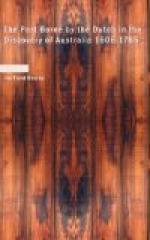* * *
{Page 41}
NOTE
That in all places where we landed, we have treated the blacks or savages with especial kindness, offering them pieces of iron, strings of beads and pieces of cloth, hoping by so doing to get their friendship and be allowed to penetrate to some considerable distance landinward, that we might be able to give a full account and description of the same; but in spite of all our kindness and our fair semblance [*] the blacks received us as enemies everywhere, so that in most places our landings were attended with great peril; on this account, and for various other reasons afterwards to be mentioned, we have not been able to learn anything about the population of Nova Guinea, and the nature of its inhabitants and its soil; nor did we get any information touching its towns and villages, about the division of the land, the religion of the natives, their policy, wars, rivers, vessels, or fisheries; what commodities they have, what manufactures, what minerals whether gold, silver, tin, iron, lead, copper or quicksilver. In the first place, in making further landings we should have been troubled by the rainy season, which might have seriously interfered with the use of our muskets, whereas it does no harm to the weapons of the savages; secondly, we should first have been obliged to seek practicable paths or roads of which we knew nothing; thirdly, we might easily have been surrounded by the crowds of blacks, and been cut off from the boats, which would entail serious peril to the sailors with whom we always effected the landings, and who are imperfectly versed in the use of muskets; if on the contrary we had had well-drilled and experienced soldiers (the men best fitted to undertake such expeditions), we might have done a good deal of useful work; still, in spite of all these difficulties and obstacles, we have shunned neither hard work, trouble, nor peril, to make a thorough examination of everything with the means at our disposal, and to do whatever our good name and our honour demanded; the result of our investigation being as follows:




